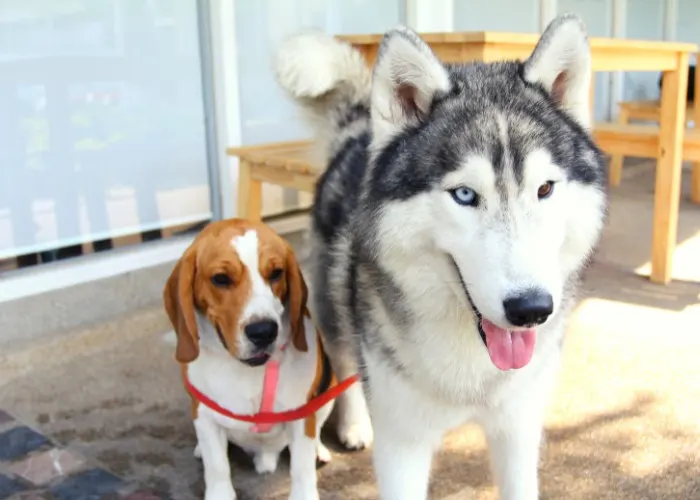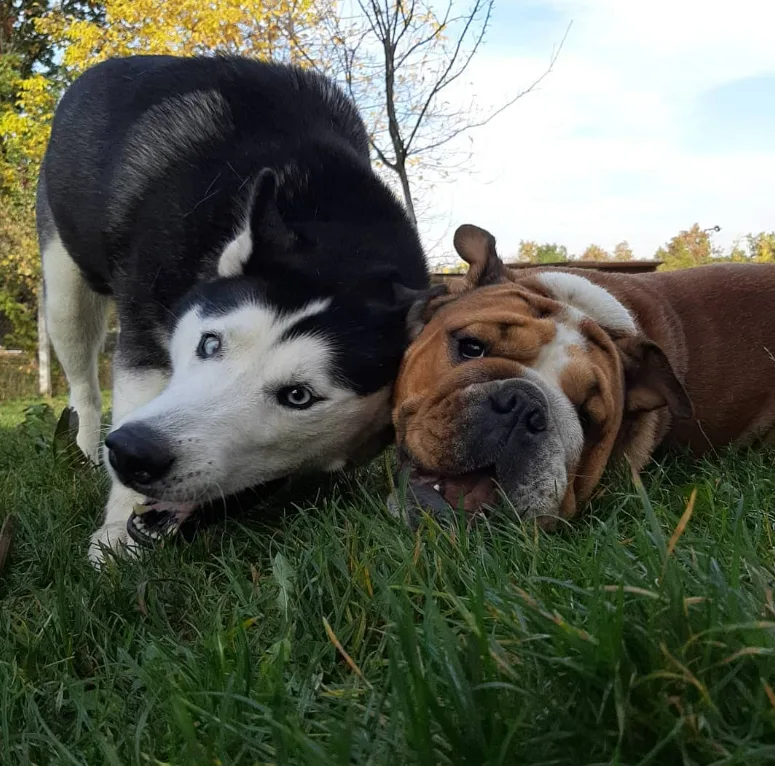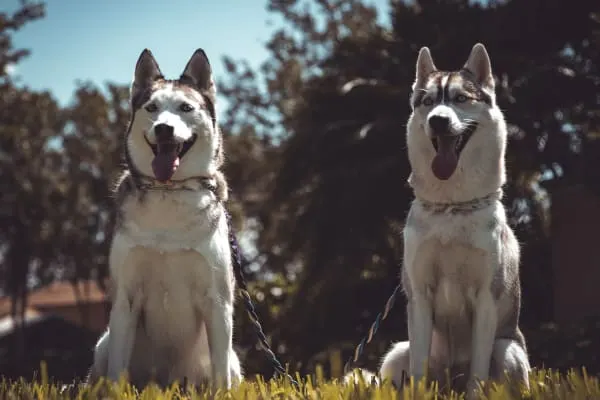Many husky owners want to know which breeds will work well with their husky. Whether you are considering getting a second dog, or you want to know in preparation for the dog park, it’s good info to know.
This article covers the top 10 best companion dogs for Siberian Huskies and has everything you need to know.
10 breeds that huskies get along with the best:
- Labrador
- Alaskan Malamute
- Australian Shepherd
- Golden Retriever
- German Shepherd
- Dalmatian
- Border Collie
- Standard Poodle
- Boxer
- English Pointer
4 Things To Consider First…
It’s important to understand a few of the key husky characteristics before comparing breeds. The Siberian husky isn’t your average dog, they’re unique, with their own attitude and personality.
For humans, opposites may certainly attract, but in the dog world, this never ends too well. Knowing what your husky is actually like will set you off on the best path.
1. High Energy
Siberian huskies are the athletes of the canine world. You may be thinking, well, don’t all dogs like going for walks? most do, but not all like running hundreds of miles at break-neck speed. Some breeds can actually be very lazy or inactive.
Breeds like Bassett hounds or English bulldogs, for example, would prefer to lay down than go for a nice long walk. After knowing how important exercise is for a husky’s entire life, you can see that having an inactive breed isn’t an accurate fit.
2. Big Prey Drive
Siberian huskies are a true “pack” dog and were bred by a nomadic hunter-gatherer tribe known as the Chukchi People. Although not their main role, huskies would have certainly helped their tribe hunt small animals. This way of living lasted for thousands of years.
Huskies, still to this day have a big prey drive. So why is that important? Well, a husky’s prey instinct to chase, grab and perhaps even kill can be triggered easily with small animals, including very small dog breeds.
This doesn’t mean to say that all smaller dogs won’t be a good fit for a husky, but it does raise important concerns that you must remember. More on this later.
3. Rough Play
On top of needing long, intensive daily exercise, huskies are known for being somewhat hyper. This stereotype doesn’t fit all husky personalities but for the most part, it is accurate. Huskies can play all day at a pace that most other breeds can’t keep up with.
Despite being extremely friendly-natured, when they play, it’s a different ball game. Huskies love to play rough, this involves a lot of jumping up, jumping on top of, grappling, and using their mouths.
There are A LOT of breeds that do not tolerate or engage in this type of “play” like huskies do. You can easily imagine how this could end badly.
4. Difficult To Train and Mischievous
Each husky and their owner is different, but huskies are known for being a challenging breed to train. They have a lot of defiance and stubbornness in them that reveals itself whenever you least want it to!
It’s necessary to consider both breeds if you’re interested in getting another dog. Owners must know that dogs are social animals, meaning that bad behavior and defiance in one dog can influence the other dog too. You may end up with two unruly dogs if training is not taken care of.
10 Breeds That Get Along Well With a Husky

Let’s cover 10 breeds that huskies typically get along with the best. These breeds match a lot of the husky’s “quirky” traits and rival them with their energy and playfulness.
1. Labrador
Labradors are perhaps the husky’s favorite dogs to play with at your local park, other than another husky! Labradors have a lot of close characteristics to huskies as well as their physical size.
Labs have similar exercise requirements, can be very active dogs and love to play. This fits perfectly for any husky out there. On top of that, they don’t mind a little bit of rough playtime and with their equal size, will definitely hold their own with a husky.
Labradors can be unruly IF not trained, but with some basic training, they can be very obedient, highly intelligent dogs and may even have a positive influence over a husky!
Related article: Husky Labrador Mix! The LABSKY Guide (with photos)
2. Alaskan Malamute
Alaskan malamutes are often considered cousins of the Siberian husky. Although the Alaskan malamute can be much bigger than a husky.
Malamutes may be unable to keep up with a husky’s speed and endurance, but they still love to run and play.
Malamutes would likely overpower any husky when they have a play fight and can definitely hold their own. On top of this, malamutes can make excellent guard dogs, whereas huskies do not. Talk about picking up the slack!
Training these two beasts could be a challenge. Both are fairly difficult to train and come with their fair share of stubbornness. Something to be well aware of before making a decision.
3. Australian Shepherd
Australian shepherds are a great match for the Siberian husky. They are very close in personality and are frequently bred together to create the Aussie Husky Mix. They are also very similar in size.
Aussies love to exercise as a husky does, high-intensity activities like running or playing frisbee is one of their favorites. Their energy and playfulness will rival that of your husky’s and they will get along great.
Both breeds are working dogs and require training and guidance. The Australian shepherd is known for being a quick learner so this may help your husky up their game too.
Overall a very equal pair that compliment each other.
Additional Breed: Can Huskies & Doberman Get Along? (Find Out)
4. Golden Retriever
Golden retrievers are very similar to labradors in how they get along with huskies.
Golden retrievers are slightly bigger than huskies, and their endurance is a little lower, but this doesn’t stop them from playing just as much.
Both breeds are friendly-natured, loving, and caring. You certainly won’t have any aggression issues with either breed.
The only difference would be that golden retrievers have a big “people-pleasing” trait, which is great for us. Retrievers are easily trained and are eager to follow commands.
Huskies are quite different and it would be difficult to know who will have influence over the other. Apart from this, these two can make great companions.
5. German Shepherd
German shepherds are actually quite different from Siberian huskies. Actually, they’re far less common than any other breeds mentioned on this list. Yet one of the most common questions I receive on a daily basis is whether or not huskies get on well with german shepherds…
So it’s clear these two breeds are desirable to have together. The good news is that it certainly can work out and huskies usually get on well with german shepherds.
How are they different? German shepherds are considerably more intelligent and can be easily trained, they love to follow commands and be extremely obedient. On top of this, they are great guard dogs and protectors. All of which huskies are not.
So how do they go well with each other? Well, german shepherds are bigger than huskies and can hold their own against them. They also have outstanding endurance, stamina, and energy levels just like a husky. Not to mention their huge desire to play.
It’s an interesting companionship, but one that can work well with an experienced owner.
Related article: Husky German Shepherd Mix! The Gerberian Shepsky!
6. Dalmatian
Perhaps one of the few breeds that crave exercise MORE than a husky. Something I never thought I would say…
The dalmatian is similar to the husky in many ways, from their size, energy levels, exercise requirements, affection, stubbornness, intelligence, and well, pretty much everything.
I know many husky owners who all agree that their husky loves playing with dalmatians at their local park. These two breeds just seem to click and enjoy each other’s company significantly.
7. Border Collie
The border collie is officially the most intelligent dog breed. Apart from their amazing intelligence, they are extremely hard-working dogs and have been used for their herding skills for a very long time.
From a life of herding, they have just as much energy as the Siberian husky, and they also love to play.
Border collies are easily trained compared to huskies and as we just mentioned, they’re rather smart too. Besides this, they’re also naturally friendly and love human company, just like huskies.
Border collies consistently get along well with huskies, and it’s a go-to option for most owners out here.
8. Standard Poodle
Poodles are highly energetic dogs that can definitely keep up with a husky’s playfulness and exercise routine.
Poodles aren’t afraid to give their fair share of rough play either. If your husky likes to engage in some rough-housing, a poodle will definitely hold their own against them.
Poodles are very intelligent and easier to train than a husky. That being said, poodles have a mischievous streak in them just like huskies. These two breeds may become partners in crime if they aren’t exercised enough.
9. Boxers
Boxers and huskies are very compatible. They absolutely LOVE playing and they both have never-ending energy.
However, these two breeds can cause quite a bit of trouble when left alone together. Although boxers are a great fit for your husky, they may not be a great fit for your sanity.
Huskies and boxers both have destructive tendencies, mix this with their high energy and distaste to being left alone… your leather sofa could be their next victim! They will have a blast, but you certainly won’t.
I only recommend getting a boxer as a second dog if your situation allows for you to be with them most of the time and provide a huge amount of exercise.
10. English Pointer
The pointer is a bundle of energy just like the husky is. These two could be the ultimate exercise partners, which will certainly satisfy your husky.
The pointer is considered a well-rounded dog with many desirable qualities. They’re naturally friendly, loyal, affectionate, intelligent, and fairly easy to train.
Huskies and pointers are two breeds who on paper, match up nicely. Although I must say, I haven’t been lucky enough to speak to any husky owners who have recently come across an English pointer so I can’t confirm this as much as other breeds above.
Related: Dobermans vs Huskies (differences, similarities, and can they work together?)
Husky Friend of The Day
Meet Luna, she’s found her friend!

Good Characteristics To Keep In Mind:
Although the list above contains only 10, there are still many more breeds that go well with huskies. It all depends on some basic characteristics.
Of course, it’s important to know that every dog is different and some traits you expect a certain breed to have, may not actually have it. All dogs differ in their personality so it’s vital to keep that in mind.
The best type of breed for your husky would be:
- Extremely outgoing
- Similar physical size (not smaller)
- Naturally sociable
- Not territorial
- Likes rough play
- Affectionate
- Average-high intelligence
- Preferably not stubborn
- Obedient (encouraging for your husky)
Most breeds with these traits will get along well with a husky. But, you’ll never really know until you get the two to meet for real!
Popular: Can Huskies Get Along With Shih Tzus
Are Huskies Good With Other Dogs?
As this is often asked I wanted to cover this question specifically before wrapping up.
This is asked so frequently, that it would seem there is a preconceived notion that huskies are not good with other dogs…
Huskies are mostly excellent with other dogs, as long as they have received plenty of socialization from a young age.
The appearance of huskies seems to, unfortunately, hold them back, with many other dog owners viewing them as a dangerous or unfriendly breed. We know, however, this couldn’t be further from the truth.
Huskies are in fact one of the most naturally friendly breeds out there, towards other dogs and strangers. Of course, every husky is different and the way they are raised plays a big part in their developed friendliness.
Are Huskies Better in Pairs

It’s time to address the elephant in the room. Yes, probably (definitely) the best second dog for your husky would be another husky.
Now, it’s worth mentioning there is yet to be any scientific evidence to support the idea that dogs can recognize their own breed. As far as we know, they still cannot.
So although your husky supposedly doesn’t know they’re next to another husky, they do naturally get along with each other better than all other breeds.
For thousands of years, huskies lived in packs, sometimes more than 10 strong, and especially back in Siberia, they would have all been Siberian huskies. So, It’s not hard to believe that huskies have a special connection with each other.
Due to this pack-life way of living, huskies hate being alone and have a strong desire to have company at all times. This is also another good reason why having two huskies, that can support each other, is better than having just one.
This is original content produced and published by My Happy Husky | www.myhappyhusky.com
Are Huskies Good With Little Dogs?
This is a very popular question and it’s somewhat difficult to give a definitive answer.
After knowing what huskies can be like, adding a small or miniature breed to your family may not be such a good idea.
A husky’s prey drive can be so strong that even a small dog can trigger the instinctive predatory sequence built into huskies.
For your husky, having a small or miniature breed dog would be no different from having a cat or bunny rabbit. Very tempting.
So what makes that a difficult answer? well, of course, there are exceptions to this and I even know someone personally here in the Philippines who has a husky and a Jack Russell, and they love each other to bits. They even sleep with each other, it’s very cute.
It comes down to each individual dog, how they are introduced and the way you train them to respect each other as valid members of the family.
So, yes, from experience I know that is possible for huskies to get along with small breed dogs, but generally, it’s not recommended
The Benefit Of Doggy Play Groups
Just as I mentioned above, you won’t really know what breed your husky gets along with the most until they meet face to face.
For example, while most huskies get along with labradors, there’s still a chance that your husky might just have something against labs… The only way you’ll know is by having some real interaction in some doggy playgroups, or at your local park where there are other dogs.
Doggy playgroups are becoming more and more popular every year. They’re awesome for building socializing skills and they provide extremely valuable mental stimulation.
You can find out if there are any doggy playgroups near to you with a quick Google search. If none appear in your local area, search for local dog parks as an alternative.
Try your best to initiate some interaction with other dogs and their owners. You can then gauge how your husky reacts to whatever dog they have.
Popular Articles on My Happy Husky
● Ways to Keep Your Husky Happy When Home Alone
● Best Dental Sticks For Huskies
● Best Dog Food for Huskies in 2020
Summary
So there you have it, you should now have a solid idea of what breeds will work best with a husky, and you have a few ideas on how to go about testing their compatibility.
If you are in the process of getting a second dog for your husky OR you already have multiple dogs, please comment below, I would love to hear your story.
Most Recommended For Huskies
Best Harness For a Husky ⭐
The Kurgo Tru-Fit Smart Harness remains to be the best harness I’ve seen for a husky. It’s affordable and reliable.
Best Online Training Program For Huskies⭐
Brain Training For Dogs has become increasingly popular with Siberian Huskies in the last few years. It’s now recognized as perhaps the best way to train a husky in the most stress-free, positive way.
Best Husky Puppy Book ⭐
If you would like an easy to read guide for training your husky puppy, check out my book The Husky Puppy Handbook on Amazon. All purchases are greatly appreciated.

Disclaimer
The advice given in this article is for educational purposes only and does not constitute professional advice in any context. Before making any decisions that may affect the health and/or safety of your dog, you should always consult a trained veterinarian in your local area. For the FULL disclaimer Visit HereCopyright Notice: The content produced and published on My Happy Husky is unique and original. My Happy Husky makes an active effort to search for plagiarized content using plagiarism detection software. If plagiarized content is found, action will be taken.
